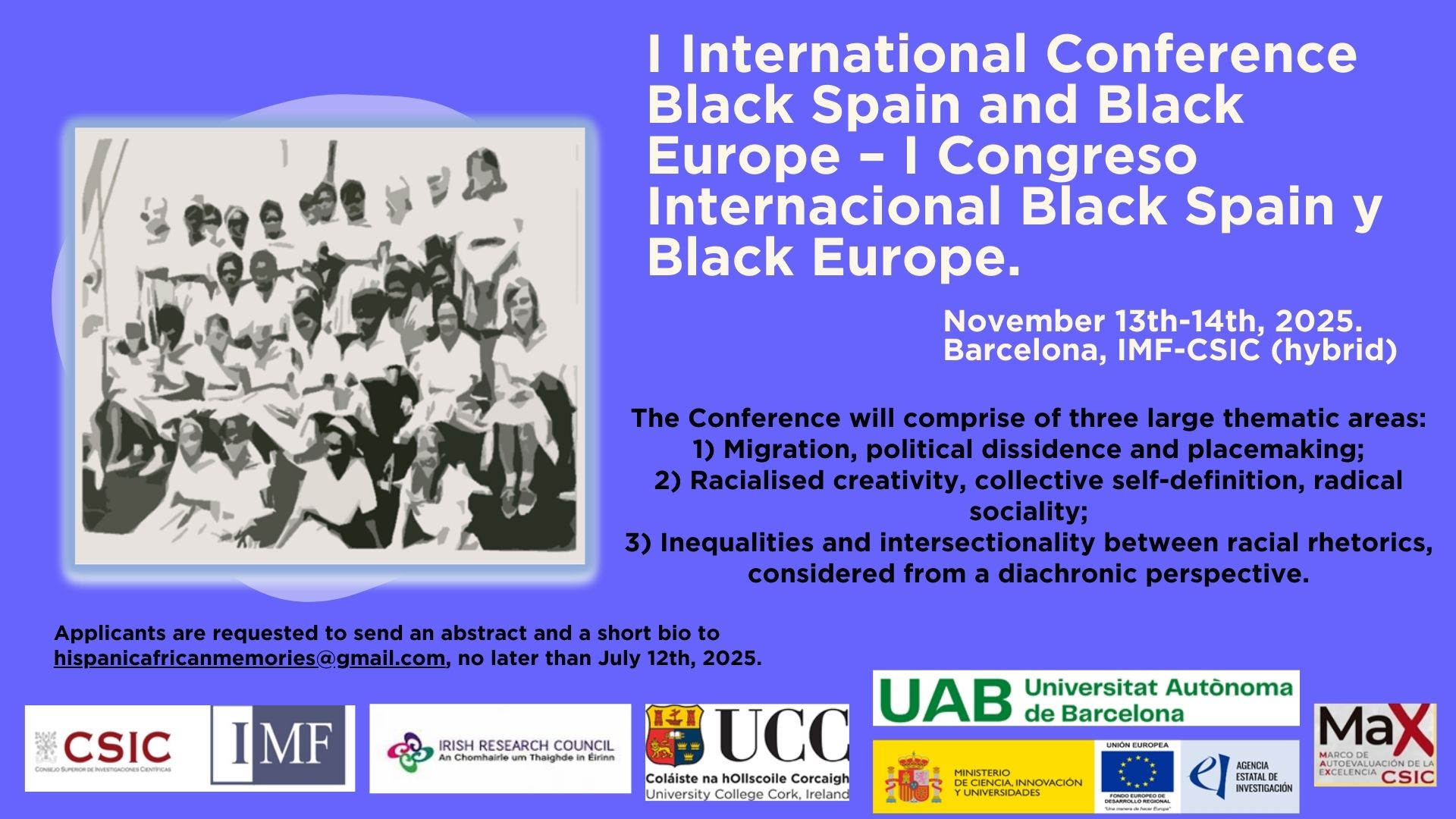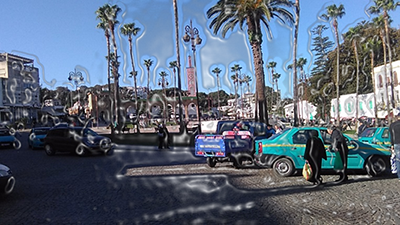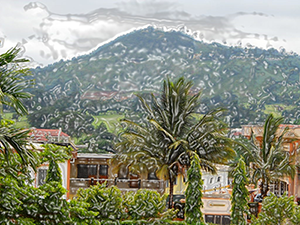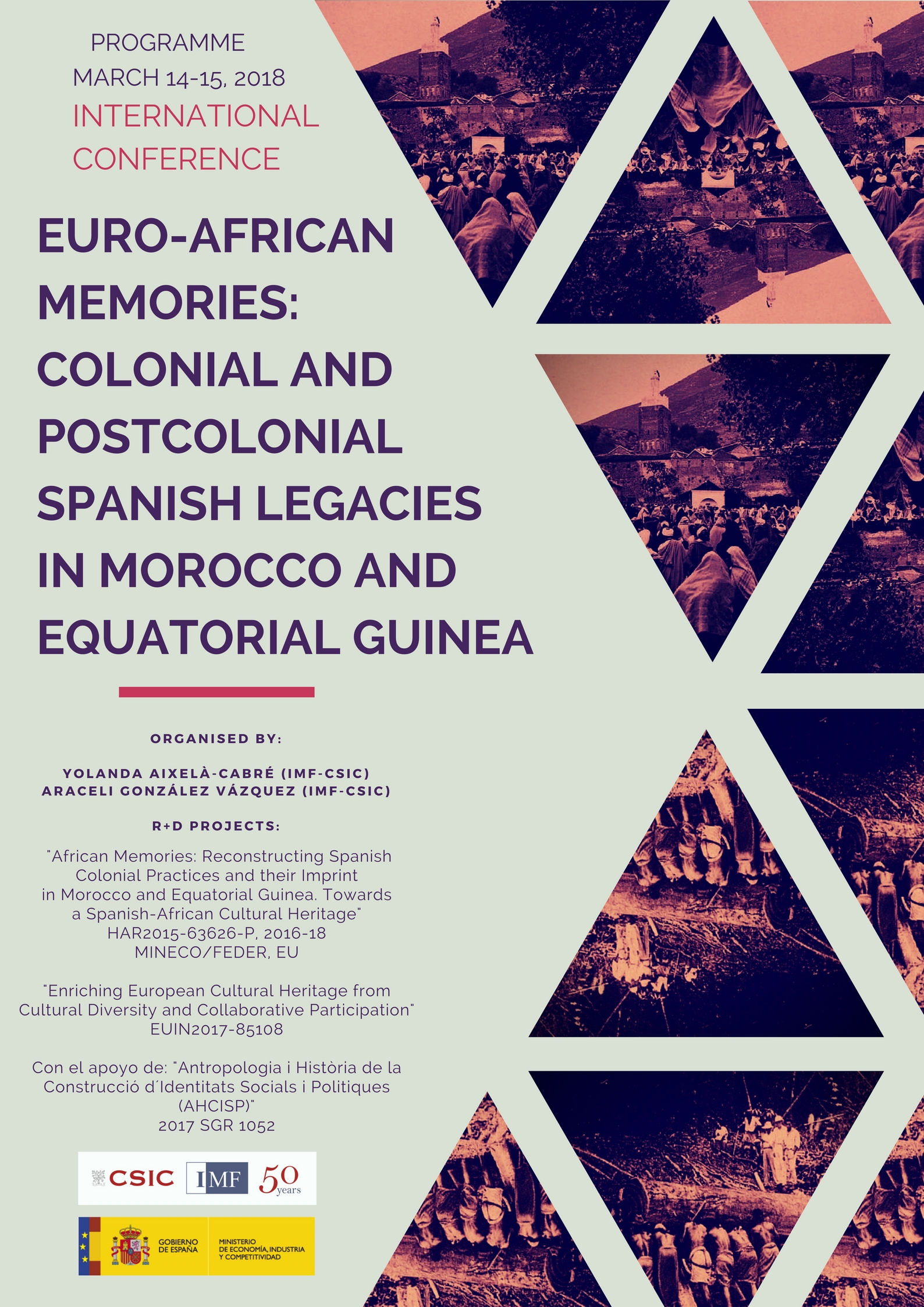I International Conference Black Spain and Black Europe
November 13th-14th, 2025
Barcelona, IMF-CSIC (hybrid)
The main objective of this event is the critical examination of the presence and radical and creative action of racialised communities of African, Maghrebi, Caribbean and Latin(x) ancestry in the context of the Spanish State as well as in other Southern European countries from the 19th century until the present time. Our aim is to critically examine memories and experiences that discuss and promote an expanded approach to contemporary history based on orality, archival practices, and creative work (including, but not limited to, visual, literary, sonic and cinematic practices). Our approach is fundamentally based on Post/Decolonial Studies and Methodologies, although other theoretical and methodological perspectives are not excluded. The adopted temporary framework is designed to trace how black individuals and collectivities have been pivotal in the process of articulating far-reaching debates on labor, belonging, precariousness, and structural (in)equalities in past and present times.
Ultimately, with this event we intend to offer an attentive, nuanced and comprehensive perspective that could contribute to the documentation and dissemination of African, Latino, Caribbean, and North African memories and legacies, addressing the urgency of bringing into circulation a past of Black-European traces that remain largely unknown and understudied in Southern Europe. Additionally, we seek to foster comparative perspectives addressing less studied areas, ultimately opening new avenues for the study of Black presence in Europe.
The Conference will comprise of three large thematic areas:
- Migration, political dissidence and placemaking.
- Racialised creativity, collective self-definition and radical sociality.
- Inequalities and intersectionality between racial rhetorics, considered from a diachronic perspective.
Coordination: Yolanda Aixelà-Cabré (IMF-CSIC), Carlos Garrido-Castellano (University College Cork/University of Johannesburg) and Mar Garcia (UAB).
Applicants are requested to send an abstract (between 500 and 1200 words) in English, Portuguese and any of the official languages of the Spanish State, and a short bio of 100 words to hispanicafricanmemories@gmail.com, no later than July 12th, 2025. A maximum of 30 contributions will be selected.
Participants will engage in a two-days event involving presentations, discussion and collaborative workshops. Selected papers will be communicated September 19th, 2025.
The call is open to themed panels and roundtables including a maximum of 3 participants. The final programme will be announced first October 2025. Inscription and participation in the event will be free, but participants are responsible for their expenses and travel costs.
Organizing Committee: Carla Almanza-Gálvez (UCC), Juan Tomás Ávila Laurel (Pen Català, Barcelona), Fernanda Barini Camargo (UCC), Nuria Fernández-Moreno (UNED Madrid), Jordi Moreras (URV, Tarragona), Ana Lúcia Sá (ISCTE-IUL, Lisboa).
Conference organized by:
- R+D Project «Africans, Maghrebis and Latins (1808-1975). Blackness, resistance and deracialization of elites» (BLACK SPAIN) (PID2022-136282NB-I00), funded by MCIN/ AEI/10.13039/501100011033/ and «FEDER Una manera de hacer Europa».
- «Assessing the Contemporary Art Novel in Spanish and Portuguese: Cultural Labour, Personal Identification and the Materialisation of Alternative Art Worlds» (ARTFICTIONS) (Irish Research Council Laureate Consolidator Programme, IRCLA/2022/3890).
Congreso Internacional “Africanos y magrebíes en la Península Ibérica (1850-1975). Una historia en los márgenes de España y Portugal”.
29-30 Abril, 2022
Barcelona, Institució Milà i Fontanals del CSIC
El tema central de este Congreso Afro-Iberia es el estudio de los africanos y magrebíes que residieron en la península ibérica entre 1850 y 1975. Este período marca el inicio de la colonización efectiva de la mayoría de los territorios africanos de España y Portugal, y el fin de su colonización. La premisa central del congreso es que la presencia de africanos y magrebíes en España y Portugal en estas fechas se enmarcó en el colonialismo ibérico y sus retóricas, lo que condicionó su traslado, asentamiento, actividades, integración y visibilidad, también en clave de género. Este congreso busca poner en común una historia Afro-Ibérica y completar la escasez de estudios existente que prácticamente ha reducido la presencia africana a su exhibición en zoos humanos y exposiciones universales, o a su participación en contiendas bélicas o actividades deportivas. El objetivo final es recopilar datos específicos sobre la realidad y las consecuencias de los africanos y magrebíes asentados en la península ibérica desde 1850 hasta 1975.
Enfoque teórico: estudios poscoloniales y decoloniales
Investigación en Humanidades y Ciencias Sociales: Antropología, Estudios Culturales, Historia Social, Filología, Sociología, Literatura, Arte.
Se ruega a los solicitantes que envíen un resumen de 500 palabras en catalán, inglés, portugués o castellano, y una breve biografía de 100 palabras a hispanicafricanmemories@gmail.com, a más tardar el 11 de enero de 2022. La lista de comunicaciones seleccionadas se comunicará el 31 de enero de 2022. El programa final se anunciará en febrero de 2022. La inscripción es gratuita. El número de participantes es limitado. No se requiere ninguna tasa. Los participantes son responsables de sus gastos de viaje y estancia. El congreso será híbrido: conferencia inaugural y paneles en línea por ZOOM (día 29 por la mañana y por la tarde, y día 30 por la mañana) y conferencia de clausura presencial en Barcelona y abierta online para los participantes que quieran asistir (30 de abril por la tarde). Los inscritos que deseen participar en una publicación colectiva están invitados a enviar una versión extendida de su trabajo (4.000 palabras en castellano) a más tardar el 20 de enero de 2022: solo se seleccionarán las mejores contribuciones.
Coordinación: Yolanda Aixelà-Cabré, Institució Milà i Fontanals-CSIC (Barcelona)
Comité Organizador:
Diana Arbaiza, Universiteit Antwerpen
Jacqueline Britto Pólvora, Universidad de Integración Internacional de la Lusofonia Afro-Brasileña (Brasil)
Nuria Fernández-Moreno, Universidad Nacional de Educación a Distancia (Madrid)
Mar García, Universitat Autònoma de Barcelona
Jordi Moreras, Universitat Rovira i Virgili (Tarragona)
Ana Lúcia Sá, ISCTE- Instituto Universitario de Lisboa
Comité Científico:
Juan Tomás Ávila Laurel, PEN-Català (Barcelona)
Eduardo Costa Dias, ISCTE- Instituto Universitario de Lisboa
Jessica Falconi, CEAD-Universidade de Lisboa
JM. Persánch, Lakeland University (Wisconsin)
Elisa Rizo, Iowa State University
Remei Sipi, E’Waiso Ipola – Editorial Mey (Barcelona)
Esta actividad es parte del proyecto de I+D+i “Africanos y magrebíes en la Península Ibérica (1850-1975). Una historia en los márgenes de España y Portugal” / “Africans and Maghrebis in the Iberian Peninsula (1850-1975). A history on the margins of Spain and Portugal” (AFROIBERIA) (PID2019-108397GB-I00/AEI/ 10.13039/501100011033), financiado/a por MCIN/ AEI/10.13039/501100011033/ y “FEDER Una manera de hacer Europa”.
Material de descarga
International Conference: “Enriching Afro-Iberian Cultural Heritage. Current trends on culture, religion and language”
Barcelona, 14-15 November, 2019
Institució Milà i Fontanals, CSIC
The starting point for this conference is the need to make visible the strategies used by cultural, religious and linguistic African minorities to express themselves in current Iberian societies. We propose to compare two case studies, historically and geographically related, Portugal and Spain, encouraging an Iberian studies perspective. Our central focus is the African continent, particularly taking into account the African-Iberian connections both in colonial and postcolonial times. Afro-Iberian Cultural Heritage strongly emerges as a pillar enabling the projection of shared values by means of raising awareness on the common memories that can be meaningful for both Africans and Europeans, putting in circulation new Afro-Iberian identifications. On the one hand, Music, Films, Dance and Literature are solid pieces of tangible Cultural Heritage given that all together are able to perform feelings and emotions of African minorities in the Iberian Peninsula. But how culture, religious and linguistic minorities are currently represented by this tangible Cultural Heritage? Is Iberian Cultural Heritage enriching Iberian diversities with these cultural productions favouring more cultural, religious and linguistic recognition? On another hand, African minorities’ intangible Cultural Heritage needs to be reinforced: it seems that little work has been done. This topic can make visible African minorities’ memories and experiences in Iberian contexts, some of which are appearing in blogs and social networks (Instagram, Facebook, etc.).
This call for papers addresses researches which main aim is to reflect on the way minorities from North Africa and sub-Saharan Africa are (or have been) enriching Iberian Cultural Heritage. The organizers encourage works on how African cultures, religions and languages are represented, discussed, mixed and reinforced. The conference addresses scholars from a wide variety of fields: Anthropology, Philology, Cultural Studies, History and Sociology.
Applicants are requested to send an abstract of 300-400 words in English, and a short bio of 100 words to hispanicafricanmemories@gmail.com, no later than October 4th, 2019. The language of the conference will be English, and all submissions and presentations must be in English. There will be no translation available. Selected papers will be communicated by October 10th, 2019. The final programme will be announced on October 14th, 2019. All participants must cover their own travel costs and living expenses.
Direction: Yolanda Aixelà Cabré (IMF-CSIC, Barcelona), Max Doppelbauer (Universität Wien, Wien), Araceli González Vázquez (IMF-CSIC, Barcelona)
Contact: hispanicafricanmemories@gmail.com
Keynote speakers: Verena Stolcke (Universitat Autònoma de Barcelona) and Elisa Rizo (Iowa State University)
Organizing Committee: Diana Arbaiza, Universitet Antwerp; Juan Tomás Ávila Laurel, Pen Català; Julia Borst, University of Bremen; Eric Calderwood, University of Illinois; Manuela Ceballos, University of Tennessee; Eduardo Costa Dias, ISCTE-IUL; Nuria Fernández-Moreno, UNED; Mar García, Universitat Autònoma de Barcelona; Jordi Moreras, Universitat Rovira i Virgili; Rui Pereira, IHC- NOVA FCSH; Jacqueline Pólvora, UNILAB; Ana Lúcia Sá, ISCTE-IUL; Sara Santamaría Colmenero, Aarhus University; Juan Manuel Santana, Universidad de Las Palmas de Gran Canaria; Remei Sipi, Editorial Mey.
Registration Period: Payment only by Bank Transfer
Registration Deadline: October 30, 2019
Early Bird – from 10 October – 20 October 2019: 80€
Late Bird – from 21 October – 30 October 2019: 100€
With the support of: “Enriching European Cultural Heritage from Cultural Diversity and Collaborative Participation” (EUIN2017-8510)
International Conference: «Euro-African Memories: Colonial and Postcolonial Spanish legacies in Morocco and Equatorial Guinea”
Fecha de celebración: 14-15 de marzo de 2018
Lugar: Institució Milà i Fontanals del CSIC – Barcelona
Dirección: Yolanda Aixelà-Cabré (IMF-CSIC) y Araceli González Vázquez (IMF-CSIC)
Coordinadores externos: Youssef Akmir (UIZ) y Khadija Karzazi (UH2C)
Financiado por: R+D Project “African Memories: Reconstructing Spanish Colonial Practices and their Imprint in Morocco and Equatorial Guinea. Towards a Spanish-African Cultural Heritage” HAR2015-63626-P (2016-2018) (MINECO/FEDER, UE)
IP: Yolanda Aixelà-Cabré.
EUIN Project “Enriching European Cultural Heritage from Cultural Diversity and Collaborative Participation”, EUIN2017-85108 (2017-2019).
IP: Yolanda Aixelà-Cabré.
Con el apoyo de: «Antropología i Història de la Construcció d’Identitats Socials i Polítiques» (2017 SGR 1052). Dir. Josep Lluís Mateo.





